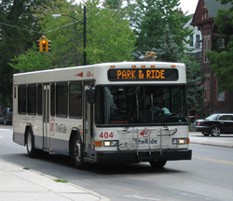Better Transit Now Group Launches In Opposition To AAATA Request For Tax Hike
Please note: Kathy Griswold is the Chair of The Ann Arbor Independent’s Editorial Board.
SUPPORTERS OF LOCAL transit argue that Mayor John Hieftje has pushed everything but local transit—trains to Howell, park and rides and bus service to Canton—at the expense of local bus service within Ann Arbor. Vivienne Armentrout, a former County Commissioner and a self-styled local transit advocate, has written of the AAATA Board: “Unfortunately, the trend with the current board is to emphasize inbound commuters from outside the city.”
Now, the AAATA Board has called for a special May 2014 vote (at a cost of $100,000) to ask voters in three cities to impose a new tax on themselves to expand bus service within Ann Arbor and Ypsilanti, and to provide service to Ypsi Township. In response, supporters of local transit have organized a group called Better Transit Now. These Ann Arbor residents, rather than see bus service expanded outside the city, want to see AAATA provide excellent service within Ann Arbor that de-emphasizes inbound commuting from outside the city.
Through a perpetual millage, Ann Arbor taxpayers fund 25-35 percent of AAATA’s annual $25-$30 million budget.

Ann Arbor resident Kathy Griswold, while not identified by the media as leading the Better Transit Now effort (she registered the group’s web domain name, however), is experienced in such campaigns. She was quoted as saying:
“I definitely think there’s a lot of fat (in the AAATA’s budget) and I believe the AAATA has not focused on their mission,” she said, expressing concerns about the agency’s interest in commuter rail between Ann Arbor and Howell. “If the AAATA was just a bus service, we could provide most of what’s needed in Ann Arbor with the existing rates.”
Ted Annis, former treasurer of the AATA Board of Directors, is outspoken in his criticisms of what he says are AAATA’s highly-paid, top-heavy management and inefficient service.
One major reason why local transit supporters oppose the proposed millage is a fundamental mistrust of the AAATA Board of Directors.
“The Mayor gives away seats on boards and commissions at parties, like candy,” complained one former Planning Commissioner. Critics suggest the AAATA Board is no exception.
Critics allege that over the past half a dozen years, John Hieftje has populated that Board with campaign donors and cronies who have voted to spend on Hieftje-backed transit schemes—even when it meant driving the organization into deficit.
Such mistrust is fueled by Hieftje’s own attempts to defend his nominees: He argued one board appointee was qualified to oversee the organization, because “she takes the bus.” One AAATA Board member is a lawyer specializing in intellectual property law and another is a spokesman for the UAW. AAATA Board member and city staffer Eli Cooper doesn’t live in Ann Arbor, and AAATA CEO Michael Ford receives a $10,000 per year car allowance.
Since 2009, candidates for local office have been increasingly vocal in their support of local transit. Candidates have argued in support of the need for AAATA to spend the $9-$11 million in millage money collected from Ann Arbor taxpayers to improve bus service within the city.
The Better Transit Now group includes Lou Glorie. Glorie suggests there’s no way to know whether bus service will improve or change in Ann Arbor if the tax hike passes. Glorie’s lack of confidence is a result of the hundreds of hours of staff time and millions of dollars the AAATA Board spent on consultants and marketing for a failed $500 million county-wide transit plan.
Despite repeated warnings from the public that the transit plan was far-fetched, supporters refused to listen. Cities and townships were opted in with the formation of a new authority set up to oversee county-wide transit. In October 2012, dozens of Washtenaw County cities and townships withdrew from the county-wide plan. Ann Arbor City Council voted to withdraw from the county-wide plan, as well. It was a debacle for Hieftje and soon thereafter two AAATA Board members stepped down.
The latest transit plan proposes using AAATA to provide bus service to what the tax hike’s supporters call an “urban core.” Hieftje salvaged that idea from the wreckage of the $500 million county-wide transit proposal. The current proposed tax hike would raise $22.5 million over the next five years: 53.5 percent of that would come from Ann Arbor taxpayers, 33 percent from Ypsilanti taxpayers and 13.5 percent from Ypsilanti Township taxpayers. This funding split—whereby Ann Arbor taxpayers subsidize Ypsilanti and Ypsilanti Township—is frequently cited as a reason to reject the new tax.
“I just don’t believe Ann Arbor voters need to approve a 34 percent tax increase for AAATA,” said Kathy Griswold.

